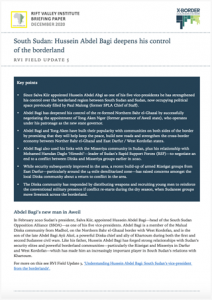In February 2020 Sudan’s president, Salva Kiir, appointed Hussein Abdel Bagi—head of the South Sudan Opposition Alliance—as one of his five vice-presidents. Abdel Bagi is a member of the Malual Dinka community from Madhol, on the Northern Bahr el-Ghazal border with West Kordofan, and is the son of the late Abdel Bagi Ayii Akol, a powerful Dinka chief and ally of Khartoum during both first and second Sudanese civil wars. Like his father, Hussein Abdel Bagi has forged strong relationships with Sudan’s security elites and powerful borderland communities—particularly the Rizeigat and Misseriya in Darfur and West Kordofan—which has made him an increasingly important player in South Sudan’s relations with Khartoum.
Recent developments in the border region show that, despite interventions from several powerful political players on both sides of the border, relations between different communities remain fragile, particularly at times when pastoralist communities move their cattle into agricultural areas. While nationally important figures like Mohamed Hamdan Daglo ‘Himedti’ in Sudan, or Hussein Abdel Bagi in South Sudan, have negotiated a broader peace along the border, which serves their long-term economic and political interests in the region, its longer-term viability remains subject to local dynamics, which may progress out of their control.
For further analysis on Hussein Abdel Bagi, read RVI Field Update 3: Understanding Hussein Abdel Bagi: South Sudan’s vice- president from the borderlands
This briefing—Field Update 5—is a product of the X-Border Local Research Network, a component of FCDO’s Cross-Border Conflict—Evidence, Policy and Trends (XCEPT) programme, funded by UKaid from the UK government. The programme carries out research work to better understand the causes and impacts of conflict in border areas and their international dimensions. It supports more effective policymaking and development programming and builds the skills of local partners.




